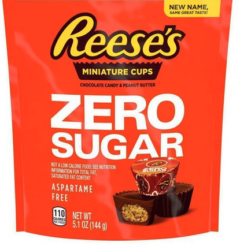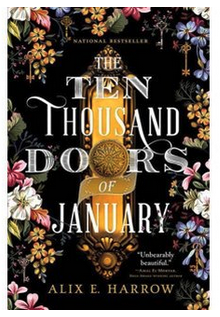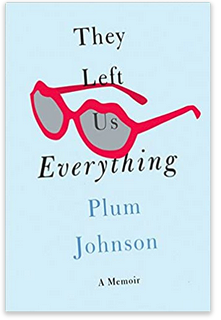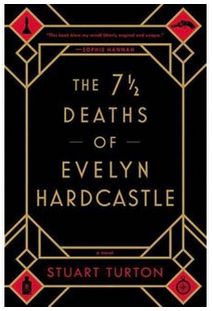Before books, I have a product to recommend. It’s my new favorite keto candy:
Reese’s Zero Sugar. Like most keto treats, they are startlingly expensive. Some days, I would rather just wait for my next Day Off and eat regular, normal-price Reese’s peanut butter cups. But some days are dreary and bleak, and a little bit of expensive candy can help considerably.
Okay: books! I finally read The Ten Thousand Doors of January, by Alix E. Harrow (Target link) (Amazon link).
There were some things I didn’t like: the cutesy title; the way toward the end it seemed like it was just one thing after another, as if to meet a page requirement. But overall I liked it very much and would recommend it. I like when a book puts magic into the real world. I kept wanting to get back to reading it. I don’t try to figure things out as I’m reading, so things dawned on me gradually in a way I found pleasant. I came to like the name January.
Next I read They Left Us Everything, by Plum Johnson (Amazon link).
This was a great book to get out of the library: it was about 50% interesting, and the rest I could skim and be glad I hadn’t bought it—but the part I did find interesting has continued to be interesting to me, and I’ve thought of it many times. The book is about a woman dealing with her parents’ possessions after their deaths. The part I found interesting was where she was talking about things she found and what she decided to do about them; I was also interested in the help she received from other people (it seems very appealing to have a friend come help, or to be that friend helping someone else). And I was interested that, in the end, she came down on the side of saying people shouldn’t try to clear out their own possessions before they die, but should let their children do it—which flies in the face of some of the other books/articles I’ve seen on the topic, so that’s been some food for thought.
The part I didn’t find interesting was all the Family Tree Bragging. I think she probably wrote this book in part for her own family to use as history/keepsake, so it was excusable/understandable. But I found the stories boring at best, cringey/embarrassing/basking-in-reflected-glory at worst. And it seems like it would only take one charmingly unscrupulous story-spinning ancestor to invent a whole bunch of boastful stories, and who would ever know?
I also had trouble identifying with the overall Boomer nature of the book. There are a lot of the sort of jolly stories many Boomers tell about their upbringing, which sound to my Gen X ears like disturbing emotional/physical abuse. I would love to read a memoir on this same topic written by someone from my generation, and another written by a Millennial, and so forth.
Proof-reading this, it sounds like I didn’t like the book, but I definitely did, and would recommend it! (Get it from the library, though.)
Next I read The 7 1/2 Deaths of Evelyn Hardcastle, by Stuart Turton (Target link) (Amazon link).
For quite awhile I had this book confused with The Seven Husbands of Evelyn Hugo, a book I found mostly boring; plus, in general I’ve been avoiding books by male authors. When I finally decided I’d read it, if only to get it off my list, I found certain elements obnoxious: the dialog, for example, where someone seriously says “It will little profit you.” That’s Drama/Cape Phrasing: anyone else would say “It won’t do you any good.” Also, people in this book SNARL their words, and many of the women have TUMBLING CURLS and so forth. And there is one extended scene where the (thin) author writes some JAW-DROPPINGLY fat-phobic/anti-disability stuff that almost made me put the book down on principle, and is still making me mad. But the good plot prevailed, and soon I was having trouble stopping reading it when it was time to make dinner. I might start it over again at the beginning to see if everything makes sense now that I know what’s going on.





I had trouble concentrating on the 7 1/2 deaths of Evelyn Hardcastle, which sometimes happens when it’s an audiobook. I didn’t love it but prevailed just to to see how they explained what was going on. Another of Alix Harrow’s books is on my book club list for the year so I’m looking forward to reading it and possibly this one as well!
I am always interested in keto treats as there is considerable overlap with diabetes-friendly treats.
Just in case you were thinking of reading Billy Summers, the recent Stephen King novel: it’s an excellent non-supernatural thriller but has so much casual fatphobia I wouldn’t recommend it to anyone. Gross, Steve.
That’s a weakness of King in general, unfortunately, which I’ve resolved to grit my teeth and ignore because I very much enjoy him otherwise.
I am a huge King fan! But this particular book was Extra.
I was struggling with 7 1/2 Deaths and skipped ahead to see if there was anything interesting coming up. I came upon the fat shaming chapter you mentioned and put it down. I don’t need that garbage in my life and I also can’t stand books where I feel constantly confused. I’ve decided life is stressful enough without having to muddle through confusing books! I was feeling badly that everyone seems to love it so it’s nice to hear you struggled with it a little as well!
I’m struck by the topic on cleaning out possessions – whether parents should do it before hand or for those left behind to do it after. My parents are aging, and were planning a move pre-covid; so me and my sisters helped them clean out some stuff (omg they had so much stuff). Since then the move was deferred due to covid; and there’s been much low grade kvetching about minor possessions that were purged (nonsensical too! Like complaining that a spare travel mug was given away when they don’t even use the first one!). So I get the idea of doing it later. But also it would be incredibly painful to do it later while also grief stricken after a death – like it’s a huge job even without the emotional freight. My husband recently lost his father, and the cleaning out he and his mother and siblings have been doing has had a lot of sad moments, on top of all the logistical and financial complications. Anyway, would be interested to hear your thoughts.
The jaw-dropping fat phobia is how I feel about JK Rowling’s depiction of Dudley Dursley. Surely, SURELY there had to be a better way to communicate that he was greedy and unpleasant!!!
It didn’t bother me when I first read the book (it came out when I was about 12 or 13) but it has been weighing on me (if you will) in recent re-readings.
My mom’s sister and 5 of her best friends joined me for one long day of cleaning out her things after she died (somewhat young and very suddenly). My uncle took my dad out of the house for the day and all my aunties and I did the work together. It was excruciating and joyful and a day steeped in love and stories and surprises. Everyone kept their choice of pieces so I did not have to ask the most important people what they wanted, then try to find it by myself etc etc. There are not many treasured memories I have surrounding my mom’s death – most of them are strictly pain – but that day was beautiful, sweet, and sad. It is a gift to do it with someone, and it is a gift to have someone to do it with you.
<3
Oh yes, my brother and sister cleaned out my Mom’s apartment after she died, and it was alot of work, but they bonded over it. I couldn’t be there because I live in another, but I joined my sister later for some together time going through other stuff of my Mom and Dad’s. It was funny, and sad, and bittersweet and all the feelings, but so glad it worked out.
I got very fed up with Plum Johnson. The stories were Too Much, especially the retelling of dreams. I was reading more for the practical details of how they split up the estate. And her wealth/privilege was beyond what most of us will ever experience – full time live-in help for elderly parents, freedom to set up an art studio and paint your feelings out, 16 months to sort through piles of stuff and enjoy the memories. Most of us have to work everyday.
I did NOT like 7 1/2 Deaths, which I read right after 7 Husbands, and both, I thought, did not live up to the buzz around them. My interest is piqued in the Plum Johnson book, or it was until I read Maggie2’s comment above! Well, as you say, that is what the library is for. I often think of what becomes of our treasures when we pass. It’s a fraught subject to be sure.
My parents are planning to move to a different continent, and one thing I am realizing in their paring-down process is how much I want the *stories* attached to things and how mysterious highly-treasured objects are without the stories.
Okay, also the difference between what they expect me to want vs. what I actually remember and want. Some ambient objects of childhood really stuck; others didn’t; if I had no idea of the significance of an object, I’m unlikely to care about it due to the significance, and it’s just going to fare as well or as poorly as it would on its own physical merits as they appealed to Small-ish Me.
Also no, I do not remember my favorite toy from when I was 6 months old…
My beloved mom recently moved far across the country from me, is aging and immune compromised, and I likely won’t see her very often anymore. She unloaded many items on me before she left as she moved to a much smaller house. At the time , it annoyed me. It seemed she was only dumping things out of convenience to her. Now that she’s gone (far), I look around and these items have become instantaneously “special” and of emotional value to me. Now I understand the hoarding tendency, or at least the strong feeling of attachment to things. Like, if one of my kids wants to take something of hers back to college I’ll likely say no! Interesting topic indeed.
Not to distract from the book review topic (that I highly appreciate) but as far as cleaning things out – my dad died 4 years ago and it took my mom + a helper and I months to just clean out my dad’s stuff (note: my parents moved out of the house I grew up in 14 years before my dad died and “downsized” so this was the second huge clean up). My mom has since moved to a retirement community and downsized again, but she still has a storage unit full of things that she doesn’t use and that I will end up throwing out. My MIL downsized 13 years ago and it took her two years to clean out her house – she’s not a hoarder, but she saved all kinds of things for sentimental reasons over the years only to find out that she wasn’t that sentimental about them when she came across them years later. ANYWAY, my take away was that for every few things that are a find when cleaning out there seemed to be hundreds of things that no one (including the owner) wanted years later so I guess I don’t really agree with the book premise but maybe that’s because my experiences weren’t really heartwarming.
My parents’ house had a major fire five years ago and insurance was great about replacing and/or cleaning things, but some things were inevitably lost. Five years later, one of my mother’s favorite topics of conversation is Here’s Another Thing We Never Got Back: Did They Steal It? My parents have so much stuff it barely fits into their large house, but that whisk! I know this is probably still partly trauma processing but it gets tough to listen to.
On books with a magic in the real world, I love The Night Circus and The Starless Sea by Erin Morgenstern and highly recommend if you haven’t read them yet.
I have checked the 7 1/2 Deaths book out of the library at least three separate times, each time thinking, “Oh, I wanted to read this!” and then I never read more than half of the first chapter or so. Apparently I do NOT want to read it. The last time, I finally learned that I don’t want to read it and have therefore resisted the urge to put it on my holds request list this time. But seriously, at least 3 times I started it. Two of the times I thought, “This seems…. familiar?” and then I eventually quit.
Also, I think that at least two of the times I thought I was borrowing the 7 Husbands of Evelyn Hugo.